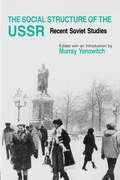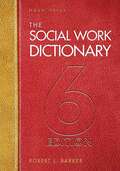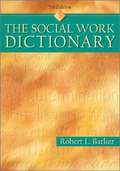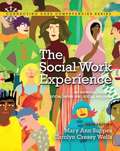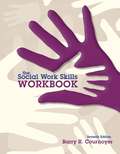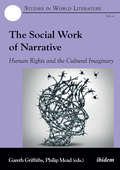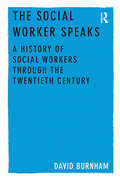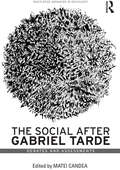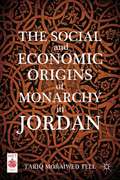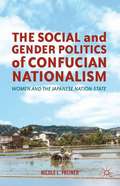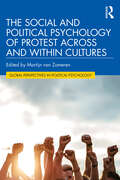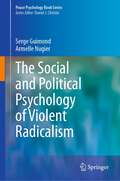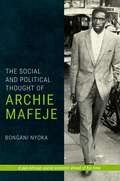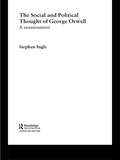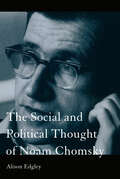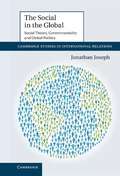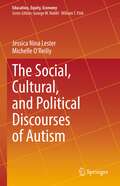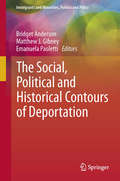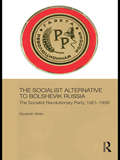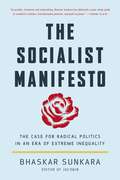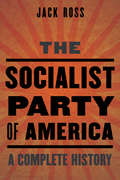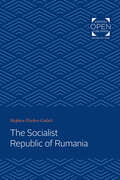- Table View
- List View
The Social Structure of the USSR: Recent Soviet Studies
by Murray YanowitchThis is a study of "karayuki-san", impoverished Japanese women sent abroad to work as prostitutes from the 1860s to the 1920s. It follows the life of one prostitute, Osaki, who is persuaded as a child of ten to accept cleaning work in Borneo and then forced to work as a prostitute in a brothel.
The Social Work Dictionary (5th Edition)
by Robert L. BarkerProvides the social worker with an abbreviated interpretation of the words, concepts, organizations, historical events, and values that are relevant to the profession. Covers some 8,000 terms, including 2,000 that are new to this edition. Other features include a list of frequently-used acronyms; a list of milestones in the development of social work and social welfare; the NASW Code of Ethics; and resources. Annotation copyrighted by Book News, Inc., Portland, OR.
The Social Work Experience: A Case-Based Introduction to Social Work and Social Welfare
by Carolyn Wells Mary SuppesThe Social Work Experience: An Introduction to Social Work and Social Welfare introduces students to the social work profession and presents detailed descriptions of eight major fields of practice. The text provides in-depth information concerning major social welfare policies that are are presented in historical perspective, along with thorough discussion of current issues and probable future trends. Major case studies assist students in understanding how professional expertise can advance social-work practice and how enlightened social policies must be present if professional interventions are to be effective.
The Social Work Experience: An Introduction to Social Work and Social Welfare (Sixth Edition)
by Mary Ann Suppes Carolyn Cressy WellsLearn how social workers use their professional expertise to assist people. This text is part of the Connecting Core Competencies Series. The Social Work Experience: An Introduction to Social Work and Social Welfare introduces students to the profession of social work including eight major fields of practice, and provides in-depth discussion of social welfare policy, its history, contemporary issues, and probable future trends. The book helps students understand how social workers use their professional expertise to assist people in solving a wide variety of problems to improve their lives. There are three major parts: The first part, Social Work and its Context, comprises four chapters which introduce the profession of social work, provide theoretical perspectives underlying generalist practice, investigate the concept of social justice, and explore social welfare policy and its history. The second part, Professional Practice Settings, offers an in-depth discussion of eight fields of practice: family and children's services, mental health, health care, schools, older adult services, criminal justice, and developmental disabilities. The third and final part, A Look to the Future, views the profession through the eyes of futurists and explores the challenges and opportunities that await new social workers. A better teaching and learning experience This program will provide a better teaching and learning experience-for you and your students. Here's how: Personalize Learning - MySearchLab delivers proven results in helping students succeed, provides engaging experiences that personalize learning, and comes from a trusted partner with educational expertise and a deep commitment to helping students and instructors achieve their goals. Improve Critical Thinking - Discussions on values, ethics, human diversity, and generalist social work practice throughout stimulate students to think critically about varying issues. Engage Students - Case studies introduce each chapter and are carefully developed to illustrate the myriad of problems that social workers deal with in daily practice. Explore Current Issues - Includes new content on a variety of issues, including policy diversity, the environment, and much more. Apply CSWE Core Competencies - The text integrates the 2008 CSWE EPAS, with critical thinking questions and practice tests to assess student understanding and development of competency. Support Instructors - An Instructor's Manual and Test Bank, Computerized Test Bank (MyTest), BlackBoard Test Item File, MySearchLab with Pearson eText, and PowerPoint presentations are included in the outstanding supplements package. Note: MySearchLab does not come automatically packaged with this text. To purchase MySearchLab, please visit: www.mysearchlab.com or you can purchase a valuepack of the text + MySearchLab (at no additional cost): ValuePack ISBN-10: 0205223095 / ValuePack ISBN-13: 9780205223091
The Social Work Skills Workbook
by Barry CournoyerTHE SOCIAL WORK SKILLS WORKBOOK gives you the opportunity to get involved in actual hands-on social work practice. Cournoyer's comprehensive workbook/textbook helps you rehearse and practice the core skills needed in contemporary social work practice. Complete with interesting case examples, summaries and skill-building exercises, THE SOCIAL WORK SKILLS WORKBOOK will help you become a more confident, ethical, and effective helper.
The Social Work of Narrative: Human Rights and the Cultural Imaginary (Studies in World Literature #4)
by Gareth Griffiths Philip MeadThis book addresses the ways in which a range of representational forms have influenced and helped implement the project of human rights across the world, and seeks to show how public discourses on law and politics grow out of and are influenced by the imaginative representations of human rights. It draws on a multi-disciplinary approach, using historical, literary, anthropological, visual arts, and media studies methods and readings, and covers a wider range of geographic areas than has previously been attempted. A series of specifically-commissioned essays by leading scholars in the field and by emerging young academics show how a multidisciplinary approach can illuminate this central concern.
The Social Worker Speaks: A History of Social Workers Through the Twentieth Century
by David BurnhamThe Social Worker Speaks charts the motivations, work activities and attitudes of social workers across the country from 1904 to 1989. The book is about workers in the public sector (from Poor Law to Social Services Departments), probation and workers in the voluntary field (including early century philanthropic visiting societies as well as specialist societies such as the Children's Society and the NSPCC). Where possible accounts by and the words and thoughts of social workers themselves are used. Since the war, histories of social work have concentrated on practice theory and methods, developments instigated by legislation, university training and professional status, but there has been little attention paid to who social workers were, what they believed, what they actually did, and what they thought of what they did. Also, individual social workers appearing in nearly all histories have been 'leaders' - managers, teachers or academics, with people who did the job on the front line accorded barely a mention. If part of the aim of this book is to remedy this partial coverage, another aim is to offer a more human history of social workers. There is too little celebration or humour in what has been published about the history of social workers; The Social Worker Speaks deliberately includes stories of how social workers behaved, their frustrations and triumphs, passions and occasional sins. So this is deliberately not a history of social work, but a history of social workers - the first of its kind.
The Social after Gabriel Tarde: Debates and Assessments (Routledge Advances in Sociology)
by Matei CandeaGabriel Tarde was a highly influential figure in 19th century French sociology: a prolific and evocative writer whose understanding of the social differed radically from that of his younger opponent Emile Durkheim. Whereas Durkheimian sociology went on to become the core of the social scientific canon throughout much of the 20th century, Tarde’s sociology fell out of the picture, and he was remembered mostly through a few footnotes in which Durkheim dismissed him as an individualist, a psychologist and a metaphysician. The social sciences and humanities are now being swept by a Tardean revival, a rediscovery and reappraisal of the work of this truly unique thinker, for whom ‘every thing is a society and every science a sociology’. Tarde is being brought forward as the misrecognised forerunner of a post-Durkheimian era. Reclaimed from a century of near-oblivion, his sociology has been linked to Foucaultian microphysics of power, to Deleuze's philosophy of difference, and most recently to the spectrum of approaches related to Actor Network Theory. In this connection, Bruno Latour hailed Tarde’s sociology as "an alternative beginning for an alternative social science". This volume asks what such an alternative social science might look like. This second edition has been expanded to include, alongside the original chapters, two key essays by Gabriel Tarde himself - Monadology and Sociology and The Two Elements of Sociology, as well as a significantly revised and extended introduction by the editor.
The Social and Economic Origins of Monarchy in Jordan
by Tariq Moraiwed TellAn interpretative history of the emergence and consolidation of the modern state in Jordan, this book examines the resilience of the Hashemite monarchy and the economic sources of social power under Ottoman, British, and post-colonial Hashemite rule.
The Social and Gender Politics of Confucian Nationalism
by Nicole L. FreinerFreiner defines a new understanding of nationalism, with a focus on the ways in which the Japanese state has utilized Confucian philosophy to create a Japanese national identity and on the impact of this on women. She examines the key policy areas of education and social security alongside the roles that women have played in these initiatives.
The Social and Political Psychology of Protest Across and Within Cultures (Global Perspectives in Political Psychology)
by Martijn Van ZomerenThis topical book explores the phenomenon of when and why people protest. Based on social and political psychology, the book takes a comparative approach across and within cultures and examines how human motivation and political and cultural contexts affect protests.Showcasing state-of-the-art chapters from a new generation of social protest researchers, the book offers an overview of research into contemporary social change over the last decade. It draws on interdisciplinary research from social and political psychology across and within cultures to increase the scope of the phenomenon of social protest. The chapters feature different international examples and discuss diverse manifestations of social protest. Each chapter explicitly connects key insights to the practice and real-life relevance of social protest.The book offers a unique perspective of the when and why of social protest, and will be essential reading for students and academics in the fields of social psychology, political psychology, politics, and sociology, as well as anyone in behavioural and social sciences interested in social movements, social protest, and social change.
The Social and Political Psychology of Violent Radicalism (Peace Psychology Book Series)
by Serge Guimond Armelle NugierThis book provides a unique perspective on the perpetrators and victims of political violence, using original evidence from the deadly attacks perpetrated in Paris in 2015. Much of the current literature focuses on the perpetrators of such violence. This volume, however, offers a deeper analysis by focusing not only on the terrorists themselves but on understanding the reactions of the general population affected by such lethal acts. It provides a more detailed view of the opponents of terrorism, namely us, and explains how our own reactions can increase or decrease, the potential for political violence. Part I introduces the most relevant theories within social psychology and political psychology that are used to understand terrorism; Part II examines empirical evidence from a French context; and Part III discusses policy implications, with the prevention of political violence as a long-term goal. Finally, the volume offers a blueprint for a more appropriate conceptualization of terrorism as arising out of intergroup conflict suggesting ways to build a resilient society. This book will be of interest to researchers, teachers and students across social psychology, sociology, political psychology and political science.
The Social and Political Thought of Archie Mafeje
by Dr. Bongani NyokaThis comprehensive treatment of Archie Mafeje as a thinker and researcher analyses his overall scholarship and his role as a theoretician of liberation and revolutionary theorySocial scientist Archie Mafeje, who was born in the Eastern Cape but lived most of his scholarly life in exile, was one of Africa's most prominent intellectuals. This ground-breaking work is the first of its kind to consider the entire body of Mafeje’s oeuvre and offers a much-needed engagement with his ideas. The most inclusive and critical treatment to date of Mafeje as a thinker and researcher, the book analyses his overall scholarship and his role as a theoretician of liberation and revolution. Author Bongani Nyoka's main argument is that Mafeje’s superb scholarship developed out of his experience as an oppressed black person and his early political education, which merged with his university training to turn him into a formidable cutting-edge intellectual force. There are three main parts to the book. Part I evaluates Mafeje's critique of the social sciences, part II focuses on his work on land and agrarian issues in sub-Saharan Africa and part III deals with his work on revolutionary theory and politics. The book engages in the act of knowledge decolonisation, making a unique contribution to South Africa’s sociological, historical and political studies.
The Social and Political Thought of George Orwell: A Reassessment (Routledge Studies in Social and Political Thought #Vol. 45)
by Stephen IngleStephen Ingle is Professor at the Politics Department, University of Stirling. His main academic interests are in the relationship between politics and literature and in adversarial (two party) politics, especially in the UK.
The Social and Political Thought of Noam Chomsky (Routledge Studies In Social And Political Thought #Vol. 24)
by Alison EdgleyThe Social and Political Thought of Noam Chomsky questions Chomsky's claim not to have a theory about the relationship between human beings and their society other than that which 'can be written on the back of postage stamp'. Edgley compares Chomsky's vision of the good society with liberal communitarian perspectives, and establishes that it is grounded in a hopeful belief about human nature. She argues that sympathy with this vision of the good society is essential for understanding the nature of Chomsky's critique of state capitalism, its inherent nationalism and the media. The author concludes that Chomsky's analysis is coherent and systematic when one acknowledges that he is not just a critic but a theorist.
The Social in the Global
by Jonathan JosephHow do influential social ideas contribute to global governance? This book takes an original approach to international relations by looking at the way social ideas help to portray the world in a particular way. Jonathan Joseph begins by analysing the role of important concepts such as globalisation, global civil society, social capital, networks and risk; then examines the role these concepts play in the discourse of international organisations. Using the concept of governmentality, he argues that contemporary social theories help justify contemporary forms of governance. By comparing organisations like the EU and the World Bank, Joseph investigates the extent to which these ideas are influential in theory and in practice.
The Social, Cultural, and Political Discourses of Autism (Education, Equity, Economy #9)
by Michelle O'Reilly Jessica Nina LesterTaking up a social constructionist position, this book illustrates the social and cultural construction of autism as made visible in everyday, educational, institutional and historical discourses, alongside a careful consideration of the bodily and material realities of embodied differences. The authors highlight the economic consequences of a disabling culture, and explore how autism fits within broader arguments related to normality, abnormality and stigma. To do this, they provide a theoretically and historically grounded discussion of autism—one designed to layer and complicate the discussions that surround autism and disability in schools, health clinics, and society writ large. In addition, they locate this discussion across two contexts – the US and the UK – and draw upon empirical examples to illustrate the key points. Located at the intersection of critical disability studies and discourse studies, the book offers a critical reframing of autism and childhood mental health disorders more generally.
The Social, Political and Historical Contours of Deportation
by Matthew J. Gibney Emanuela Paoletti Bridget AndersonIn recent years states across the world have boosted their legal and institutional capacity to deport noncitizens residing on their territory, including failed asylum seekers, "illegal" migrants, and convicted criminals. Scholars have analyzed this development primarily through the lens of immigration control. Deportation has been viewed as one amongst a range of measures designed to control entrance, distinguished primarily by the fact that it is exercised inside the territory of the state. But deportation also has broader social and political effects. It provides a powerful way through which the state reminds noncitizens that their presence in the polity is contingent upon acceptable behavior. Furthermore, in liberal democratic states immunity from deportation is one of the key privileges that citizens enjoy that distinguishes them from permanent residents. This book examines the historical, institutional and social dimensions of the relationship between deportation and citizenship in liberal democracies. Contributions also include analysis of the formal and informal functions of administrative immigration detention, and the role of the European Parliament in the area of irregular immigration and borders. The book also develops an analytical framework that identifies and critically appraises grassroots and sub national responses to migration policy in liberal democratic societies, and considers how groups form after deportation and the employment of citizenship in this particular context, making it of interest to scholars and international policy makers alike. "It is commonly surmised that the increased flows of goods, ideas, finance and people are slowly leading to the dissolution of boundaries between nation-states. However, as the varied and excellent chapters in this collection demonstrate, the enforcement of state power through detention and deportation is still a real and growing feature of contemporary political life. Expulsion has always been a moral sanction (think of Adam and Eve being banished from the Garden of Eden or the ostracism directed against dissidents in ancient Athens, who were forced to leave for ten years). As the editors suggest, deportation remains a means of enforcing a normative order ('a community of values'), while the authors and editors of this book have expanded the subject-matter to include the deportees' perspectives and the effects of deportation on families, other potential victims and on those whose social inclusion has been affirmed by the exclusion of others. These studies will enrich and enlarge the study of the more naked forms of state power." - Robin Cohen, Professor Emeritus of Development Studies, University of Oxford "This wide-ranging, well-researched, and highly informative work is a major contribution to the growing body of scholarship examining the harsh consequences of deportation around the world. The editors have gathered an impressive group of scholars who craft an eclectic view of how deportation has evolved, what it may signify, and how it now works in various settings. With its inclusion of historical, institutional, comparative, and finely-textured, sensitive experiential studies, this book offers an important--if frequently distressing--overview of phenomena that deserve our full attention." - Daniel Kanstroom, Professor of Law and Director, International Human Rights Program, Boston College Law School
The Socialism of Fools?
by William I. BrusteinAnti-Semitism, as it has existed historically in Europe, is generally thought of as having been a phenomenon of the political right. To the extent that nineteenth- and early twentieth-century leftist movements have been found to manifest anti-Semitism, their involvement has often been suggested to be a mere fleeting and insignificant phenomenon. As such, this study seeks to examine more fully the role that the historic European left has played in developing and espousing anti-Semitic views. The authors draw upon a range of primary and secondary sources, including the analysis of left- and right-wing newspaper reportage, to trace the relationship between the political left and anti-Semitism in France, Germany, and Great Britain from the French Revolution to World War II, ultimately concluding that the relationship between the left and anti-Semitism has been much more profound than previously believed.
The Socialist Alternative to Bolshevik Russia: The Socialist Revolutionary Party, 1921-39 (BASEES/Routledge Series on Russian and East European Studies)
by Elizabeth WhiteThe Socialist Revolutionary party, which had been the largest and most popular party in Russia in 1917, did not after the October Revolution just disappear into the "dustbin of history", as Trotsky hoped, but – led by its leadership in exile in the 1920s and 1930s – continued to observe and comment on developments in Russia. In emigration, the Socialist Revolutionary (SR) party often put forward policy proposals on a wide range of topics: policies which, based on a shrewd understanding of the real situation in Russia, offered realistic alternatives to the policies being pursued by the Marxist Bolshevik regime. This book fills a gap in examining one of the most significant Russian political parties, and is based on extensive original analysis of SR party materials, shows how it operated; how it formulated and disseminated its ideas; what these ideas were, and how the party's ideas developed in response to changing circumstances in Russia and Europe more widely. Far from being the agrarian Slavophile romantics as they are often portrayed, this book shows the SRs were energetic European modernisers who contributed vigorously to the leading debates of their day; it also shows how the SR vision of a populist, socialist regime failed to materialise as state control, dictatorship and the collectivisation of agriculture took hold.
The Socialist Ideas of the British Left’s Alternative Economic Strategy
by Baris TufekciThis book provides the first book-length study of the political and economic ideas of the British left’s Alternative Economic Strategy in the 1970s and early 1980s. Discussing the AES’s approaches to capitalism, the nation state and the working class, it argues that existing academic accounts have significantly overstated the radicalism of the strategy. Perhaps more notable, especially in the light of its stated ‘revolutionary’ aims, was the extent of its moderation – its continuities with post-war Labour revisionism, its marked reluctance to look beyond the market economy, the degree of its preoccupation with Britain’s global-economic status, and its inability to break with Labourist politics of class co-operation in the national interest. While the book argues that the AES was the last ‘class politics’ socialist initiative in mainstream British politics, it also explores the ways in which its ideas perhaps prepared the way for New Labour in the 1990s, and its relationship with 'Corbynism' since 2015.
The Socialist Manifesto: The Case for Radical Politics in an Era of Extreme Inequality
by Bhaskar SunkaraFrom one of the most prominent voices on the American Left, a galvanizing argument for why we need socialism in the United States todayWith the stunning popularity of Bernie Sanders and Alexandria Ocasio-Cortez, Americans are embracing the class politics of socialism. But what, exactly, is socialism? And what would a socialist system in America look like? In The Socialist Manifesto, Bhaskar Sunkara explores socialism's history since the mid-1800s and presents a realistic vision for its future. The editor of Jacobin magazine, Sunkara shows that socialism, though often seen primarily as an economic system, in fact offers the means to fight all forms of oppression, including racism and sexism. The ultimate goal is not Soviet-style planning, but to win rights to healthcare, education, and housing, and to create new democratic institutions in workplaces and communities. A primer on socialism for the 21st century, this is a book for anyone seeking an end to the vast inequities of our age.
The Socialist Party of America: A Complete History
by Jack RossAt a time when the word “socialist” is but one of numerous political epithets that are generally divorced from the historical context of America’s political history, The Socialist Party of America presents a new, mature understanding of America’s most important minor political party of the twentieth century. From the party’s origins in the labor and populist movements at the end of the nineteenth century, to its heyday with the charismatic Eugene V. Debs, and to its persistence through the Depression and the Second World War under the steady leadership of “America’s conscience,” Norman Thomas, The Socialist Party of America guides readers through the party’s twilight, ultimate demise, and the successor groups that arose following its collapse.Based on archival research, Jack Ross’s study challenges the orthodoxies of both sides of the historiographical debate as well as assumptions about the Socialist Party in historical memory. Ross similarly covers the related emergence of neoconservatism and other facets of contemporary American politics and assesses some of the more sensational charges from the right about contemporary liberalism and the “radicalism” of Barack Obama.
The Socialist Republic of Rumania (Integration And Community Building In Eastern Europe)
by Stephen Fischer-GalatiOriginally published in 1969. Rumania faced the problem, shared by other independently minded communist states in the era of the Soviet bloc, of pursuing independent policies in foreign and intra-bloc relations and in its domestic affairs without provoking the Soviet Union to a military reaction. The efforts of the Rumanian leadership in this direction were aided by the fact that there was no politically relevant pro-Moscow elite that could take over if Ceausescu and his followers were deposed by force. Writing his study during the communist period, Professor Fischer-Galati concludes that the future of Rumanian integration into the communist party-state system hinges on the resolution of differences with the Soviet Union and that no meaningful reconciliation appears likely while the present Rumanian and Russian elites remain in power. The author believes, however, that the Rumanians will continue to pursue their independent course—one that could stimulate greater popular support and participation in the country's affairs, although it may not lead to a realization of Ceausescu's social nationalist goals.
